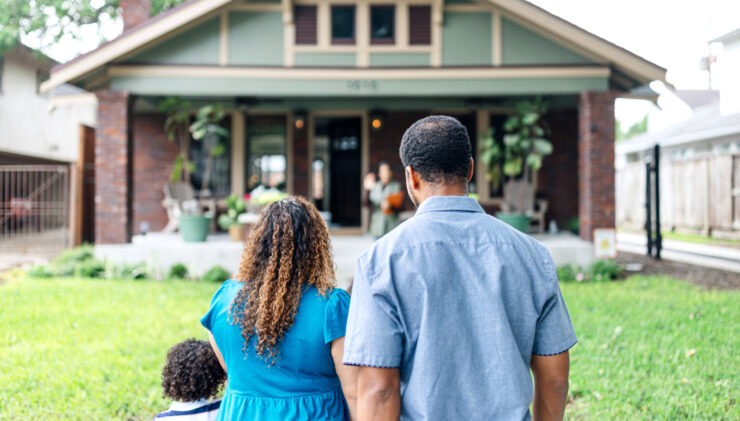 Real Estate Industry Trends to Watch in 2025
Real Estate Industry Trends to Watch in 2025Despite rising home prices and high interest rates, many people still view homeownership as the American dream. A poll from Citi found that 70% of Gen Zers and 63% of Millennials plan to buy a home in the next five years. If you’re hoping to buy a home soon, consider these tips for first-time homebuyers.
Evaluate All Your Down Payment Options
You don’t have to put 20% down. FHA loans are available with down payments as low as 3.5% to qualifying first-time homebuyers, whereas the USDA offers loans with 0% down for homes in rural areas. Plus, many states have programs to help first-time homebuyers with their down payments.
Although a smaller down payment may make it easier for first-time homebuyers to purchase a house, it may also mean that you have to pay for private mortgage insurance in addition to homeowners insurance, which will increase your monthly payments. Still, it may be worth it, so you can get into a home quickly, and start building equity.
Save Some Money for Emergency Expenses
If you’re ever seen the 1980s classic The Money Pit, you know that unexpected home repairs may drain a person’s savings. Hopefully, your experience won’t be nearly as catastrophic (see the section on home inspections below), but you should assume that you’ll have some unexpected expenses.
If you spend every last penny you have on the down payment and immediate moving costs, you won’t have anything left over for appliances that break, an HVAC system that needs replacing, or a roof that needs repairing. If you don’t have enough money to set something aside for emergencies, consider waiting to buy a home until you’ve saved up more.
Calculate Your Budget
Even if you’re making a hefty down payment, you will need to calculate your monthly budget. Determine how much you can afford to allocate each month for house-related expenses. Be realistic about your estimates, making sure you include some room in your budget for emergencies and savings.
Include the following costs:
- Monthly mortgage payments
- Homeowners insurance
- Private mortgage insurance (if your down payment is below 20%)
- Property taxes
- Utilities
- HOA fees (if applicable)
Shop Around for the Best Interest Rates
Before you begin shopping for a home, it’s smart to get pre-approved for a loan.
A small difference in interest rates will make a big difference to your mortgage costs. Before settling on a lender, compare mortgage providers and programs to find the best rates available.
Your rates will depend on a number of factors, including current market conditions and your personal financial situation. Before buying a home, it’s smart to get your credit score as high as possible. According to Experian, you’ll need a score of at least 620 to qualify for most conventional mortgage programs.
Once you’ve been pre-approved, avoid anything that could negatively impact your eligibility, such as taking out a loan to buy a car or switching jobs.
Find a Real Estate Agent You Trust
As a first-time homebuyer, you likely have a lot of questions about the homebuying process. You may even be unsure about which questions you need to ask. A real estate agent can help you, but it’s important to find one you can trust to represent your interests.
If any of your relatives, friends, and colleagues have purchased a home in the area or know someone who has, ask them for recommendations. Otherwise, look online to search for agents – but make sure you check out their reviews.
Meet with an agent before agreeing to work together to make sure you feel comfortable. Some questions to ask include:
- How do you get paid? Until recently, the commission for real estate agents was fairly standardized, with sellers footing the bill. However, a recent legal case known as the NAR settlement has changed things. Now, costs are split, which allows buyers and sellers to negotiate costs. This Wall Street Journal article has more information.
- Do the you ever represent both sides of a transaction? In some states, real estate agents are not allowed to represent both the buyer and seller (dual agency), due to the potential for conflicts of interest.
- What experience do you have? Find out how long the person has been working as a real estate agent. If the agent is new, find out whether he or she is working under the guidance of more experienced agents.
Make a List of Your Must-Haves and Your Nice-to-Haves
No house is perfect. When buying your first house, you may be unable to find or afford everything you want. At the same time, you don’t want to settle for a house that doesn’t meet your needs. Make a list of your must-haves (non-negotiables) as well as your nice-to-haves. Consider the following:
- Consider your commute and the school district.
- Keep in mind that bigger homes take more energy to heat and cool.
- Age/Condition. Don’t buy a fixer-upper if you don’t have the money and time to fix it up.
- Consider whether you want to be part of an HOA.
- Natural Disaster Risk. Consider the risk of floods and wildfires.
Home Inspections and Appraisals
Most offers are contingent on the home inspection process. Although some buyers waive their right to a home inspection to make themselves more attractive to sellers, this is risky. In fact, your lender may not allow it. The home inspection is your chance to find out what problems the house has. If anything comes up, you can ask the seller to fix it or negotiate to reduce the price of the house. Also consider requesting additional inspections, such as a sewer scope.
Be Patient
It may take a while to find “the one.” Plus, you may have to make offers on multiple houses before a seller accepts your offer. Even then, there’s a chance that the deal will fall through – for example, if the house fails the inspection. Be patient, but also be ready to act quickly.
Are you buying a home? Heffernan Insurance Brokers can help you with your homeowners insurance needs. We can also help you secure life insurance to protect your family’s investment. Learn more.


